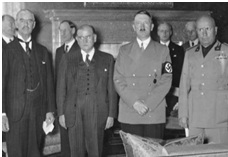|
 |
|
 |
Adolf Hitler Leadership
Adolf Hitler (1889-1945)
Austrian dictator of Nazi Germany (pictured right), who caused the mass slaughter of the Second World War including the murder of 6 million Jews in the Holocaust. His rise to power was helped by
Once elected in 1933, he ruled by fear and force, helped by the Gestapo and the SS. He committed suicide in his Berlin bunker before the Russian army could catch him. His book, Mein Kampf (1925), outlined his evil ideas, including:
For more detail see... The Battle of Britain and D-Day in the History Highlights section.
Why did he fail as a leader?
1. The failure of force He believed in fear and violent aggression, a policy that worked well, until his defeat in the Battle of Britain of 1940. His leadership showed that ultimately persuasion is better than coercion.
2. Arrogance He thought he knew best, and made his worst decisions without listening to his military advisers . These included the three turning points of the Second World War: • the bombing of Britain’s cities (the Blitz) instead of its airfields • declaring war against America immediately after Pearl Harbour • invading Russia (then called the Soviet Union) in June 1941, leading to a war on two fronts.(pictured right with his generals planning the invasion) He was over-confident and refused to give his troops winter clothing and equipment in the bitter Russian winter.
3. Poor administrator and decision maker He hated discussion (cabinet meetings were extremely rare), and there was never any open debate about policy. So his prejudices and evil opinions never changed. He kept his ministers and military chiefs separate, allowing them to build their own empires and squabble amongst themselves, so that only he had a comprehensive view of Germany’s overall strategy. This led to his biggest mistake, his failure to organize the economy to produce enough weapons. He often procrastinated and worried over his decisions, making him temperamental and desperate in a crisis. 4. Poor human relationships He was a loner who had difficulty getting on with people because of his mistrust of them (particularly in 1943 and after), vanity, egotism, contemptuous attitude to women, deceit and dishonesty. For example, he lied to the British prime minister, Neville Chamberlain, over the Munich peace agreement of 1938 (pictured right, Chamberlain is on the extreme left) He couldn’t listen to other people and take an interest in what they said.
5. Self-delusion He refused to face reality and lived in
a fantasy world, particularly after his big defeats in 1942 at El Alamein and
Stalingrad in 1943. He refused to hear any bad news, convinced himself of his invincibility, ignored the danger of the D-Day invasion and wrongly believed his V1 and V2 flying bombs would beat Britain. Like Joseph Stalin (pictured right) he was highly narcissistic, i.e. only his needs, feelings and thoughts (not anybody else’s) were important and real to him.
6. Bad people He chose other evil people for their loyalty rather than their ability. A few were brilliant, particularly Joseph Goebbels (pictured together right with Goebbels' daughter, later killed by her father), his propaganda chief. But many of his deputies were incompetent including Herman Goering, the head of the Luftwaffe, the German air force. He surrounded himself with mediocre people who never challenged him or gave him the right information.
7. Paranoia He was obsessed with being surrounded by enemies, particularly Jews, communists, trade unions, and his enemies in war.
8. Little learning His arrogance, aloofness and isolation meant that he learnt very little. Everything he did confirmed his own opinions and sense of invincibility.
9. Bad philosophy His racist, anti-Semitic views distracted him from the job of winning the war (pictured right is the entrance to Auschwitz concentration camp). He believed that the Christian belief in love and humility was human weakness, and success only came from
brutish violence and fear. Conscience was a “Jewish invention, a blemish, like circumcision”, he said. He was convinced of his infallibility and invincibility through his belief in the philosopher Georg Hegel’s (pictured right) idea that the best leaders are autocratic heroes and evil, if necessary.
He was also influenced by Nietzsche’s (pictured right
below) concept of a “superman” who triumphs through the strength of his
will.
Key quotes on leadership Make the big lie, make it simple, keep saying it, and eventually they will believe it. I have not come into the world to make men better, but to make use of their weaknesses. The art of leadership...consists in consolidating the attention of the people against a single adversary. The broad masses of the people can be moved only by the power of speech
Key quote on strategy Strength lies not in defence but in attack.
Key quote on public speaking Only constant repetition will finally succeed in imprinting an idea on the memory of the crowd.
Key quote on politics and government How fortunate for governments that the people they administer don’t think.
Key quote on success Genius is a will-o-the-wisp if it lacks a solid foundation of perseverance and fanatical tenacity.
Key quote on corporate culture All propaganda must be popular and its intellectual level must be adjusted to the most limited intelligence among those that it is addressed to. |
|
|
||
|
|
|
||
|
||
| Copyright © wisdomtowin.com All Rights Reserved | ||
|









